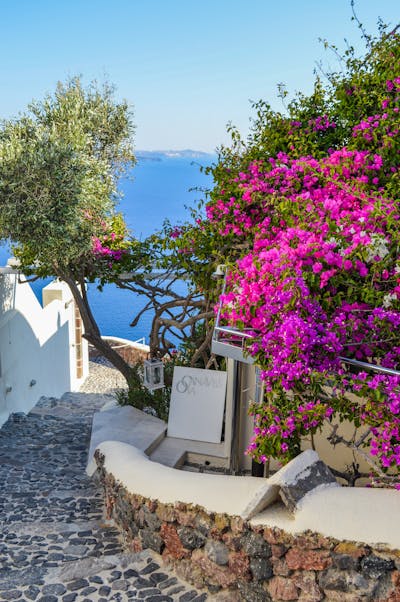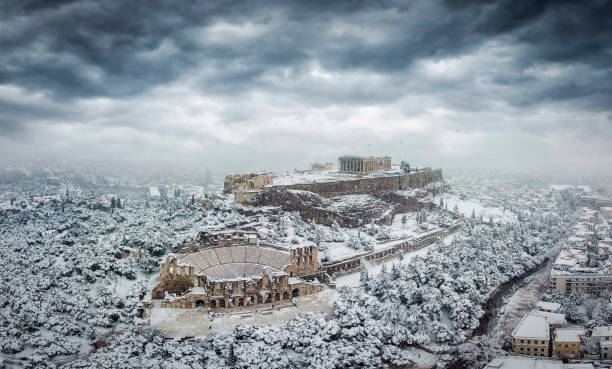Imagine Santorini’s caldera without the selfie sticks. Athens’ ancient ruins silent except for the crunch of frost underfoot. Or Crete’s mountainsides, where shepherds trade beach towels for wool cloaks and snowshoes.
Greece in winter isn’t a consolation prize—it’s a secret season where myths feel alive, prices plummet, and you become the protagonist. Here’s why ditching summer could be your best travel decision yet.


1. Crowds? What Crowds?
Summer: A sweaty scrum at the Acropolis.
Winter: Wander the Parthenon like Pericles himself, with only the crows for company.
Island Serenity: Hydra, Symi, and Naxos shed 90% of tourists. Stay in a harborfront mansion for €50/night.
Meteora Magic: Monasteries perched on sandstone pillars loom through mist, straight out of a fantasy novel.
Pro Tip: Book a guided tour—guides are relaxed, stories are richer, and you’ll get extra ouzo.
2. Winter Feasts: Where Greeks Actually Eat
Forget overpriced tavernas hawking “tourist menus.” Winter is when Greeks reclaim their tables—and you’re invited.
Comfort Food Heaven: Dive into stifado (wine-braised beef), gemista (stuffed veggies), and chestnut soup.
Carnival Cravings: Pre-Lent, towns like Patras and Skyros erupt with masquerades and souvlaki feasts. Don’t miss tsiknopempti (“Smoke Thursday”), where grills blaze till dawn.
Local Secret: In Thessaloniki, join the bougatsa crawl—warm custard pies paired with winter coffee.
3. Snowy Peaks + Deserted Beaches = Yes, Really
Ski the Gods’ Playground:
Mount Parnassos: Carve slopes 2 hours from Athens, then soak in Arachova’s thermal springs.
Pelion: A fairytale peninsula where horse-drawn sleighs glide past orchards dusted in snow.
Beach Bliss for Introverts:
Crete’s Elafonissi: Pink sands and turquoise waters—all yours. Water’s chilly, but the photos are fire.
Corfu’s Paleokastritsa: Storm-watch over a seaside frappé as waves slam cobalt cliffs.
4. Festivals That Ignite the Cold
Greeks don’t hibernate—they celebrate winter.
Christmas in Thessaloniki: Europe’s most underrated markets, with mulled wine, baklava, and a 15m pirate ship made of lights.
Epiphany Day (Jan 6): Watch priests toss crosses into icy harbors; swimmers dive for blessings (and bragging rights).
Apokries (Carnival): Skyros’ “goat dances”, Rethymno’s Venetian parades, and wild koudounati bell rituals in the Peloponnese.
5. Thermal Springs: Nature’s Hot Tubs
Ancient Greeks swore by thermal baths for healing—and winter’s the perfect time to test their theory.
Edipsos (Euboea): Aristotle’s favorite spa town. Soak in 80°F springs as the Aegean churns nearby.
Kamena Vourla: Mix a volcanic mud bath with views of Mount Parnassos.
Methana: Hike an active volcano by day, soak in sulfuric pools by night.
6. Prices That’ll Make You Swoon
Flights: Athens round-trip from €150 in January vs. €500 in July.
Luxury Stays: Mykonos’ 5-star hotels drop from €800/night to €150.
Car Rentals: €15/day vs. summer’s €75.
Insider Hack: Winter ferry tickets are 40% cheaper. Island-hop like a billionaire.
7. The Light. Oh, the Light.
Winter sun in Greece is softer, golden, slanting—it’s why poets call it “the season of Athena.”
Photography Wins: Delphi’s ruins glow amber at sunrise.
Sunset Secret: Santorini’s caldera, minus the crowds, feels like a private VIP show.
How to Survive (and Thrive) in Winter Greece
Pack Layers: Days can hit 60°F (15°C), nights dip to 40°F (5°C).
Check Schedules: Some islands have reduced ferries; stick to Crete, Corfu, or the mainland for ease.
Embrace the Kafeneio: Cozy up in old-man cafes with board games, tsipouro, and stories from locals.
Conclusion: Greece’s Best-Kept Secret
Winter strips Greece bare—not of beauty, but of distractions. It’s when you’ll hear the crunch of olive leaves underfoot, taste smoke-tinged wine by a village hearth, and realize why Greeks call their country “the eternal season.”
